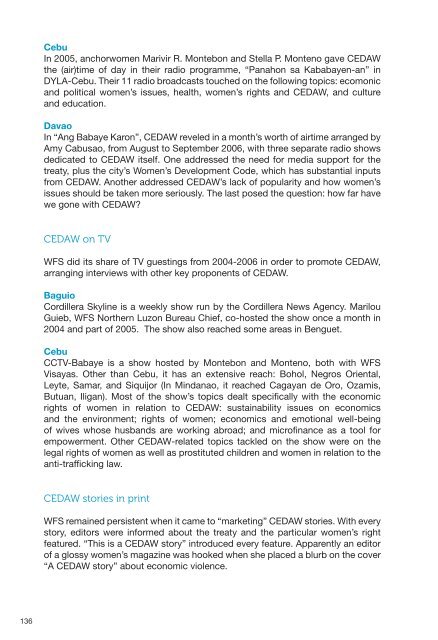Section 3 - Educating and Partnering for CEDAW
Section 3 - Educating and Partnering for CEDAW
Section 3 - Educating and Partnering for CEDAW
You also want an ePaper? Increase the reach of your titles
YUMPU automatically turns print PDFs into web optimized ePapers that Google loves.
Cebu<br />
In 2005, anchorwomen Marivir R. Montebon <strong>and</strong> Stella P. Monteno gave <strong>CEDAW</strong><br />
the (air)time of day in their radio programme, “Panahon sa Kababayen-an” in<br />
DYLA-Cebu. Their 11 radio broadcasts touched on the following topics: ecomonic<br />
<strong>and</strong> political women’s issues, health, women’s rights <strong>and</strong> <strong>CEDAW</strong>, <strong>and</strong> culture<br />
<strong>and</strong> education.<br />
Davao<br />
In “Ang Babaye Karon”, <strong>CEDAW</strong> reveled in a month’s worth of airtime arranged by<br />
Amy Cabusao, from August to September 2006, with three separate radio shows<br />
dedicated to <strong>CEDAW</strong> itself. One addressed the need <strong>for</strong> media support <strong>for</strong> the<br />
treaty, plus the city’s Women’s Development Code, which has substantial inputs<br />
from <strong>CEDAW</strong>. Another addressed <strong>CEDAW</strong>’s lack of popularity <strong>and</strong> how women’s<br />
issues should be taken more seriously. The last posed the question: how far have<br />
we gone with <strong>CEDAW</strong><br />
<strong>CEDAW</strong> on TV<br />
WFS did its share of TV guestings from 2004-2006 in order to promote <strong>CEDAW</strong>,<br />
arranging interviews with other key proponents of <strong>CEDAW</strong>.<br />
Baguio<br />
Cordillera Skyline is a weekly show run by the Cordillera News Agency. Marilou<br />
Guieb, WFS Northern Luzon Bureau Chief, co-hosted the show once a month in<br />
2004 <strong>and</strong> part of 2005. The show also reached some areas in Benguet.<br />
Cebu<br />
CCTV-Babaye is a show hosted by Montebon <strong>and</strong> Monteno, both with WFS<br />
Visayas. Other than Cebu, it has an extensive reach: Bohol, Negros Oriental,<br />
Leyte, Samar, <strong>and</strong> Siquijor (In Mindanao, it reached Cagayan de Oro, Ozamis,<br />
Butuan, Iligan). Most of the show’s topics dealt specifically with the economic<br />
rights of women in relation to <strong>CEDAW</strong>: sustainability issues on economics<br />
<strong>and</strong> the environment; rights of women; economics <strong>and</strong> emotional well-being<br />
of wives whose husb<strong>and</strong>s are working abroad; <strong>and</strong> microfinance as a tool <strong>for</strong><br />
empowerment. Other <strong>CEDAW</strong>-related topics tackled on the show were on the<br />
legal rights of women as well as prostituted children <strong>and</strong> women in relation to the<br />
anti-trafficking law.<br />
<strong>CEDAW</strong> stories in print<br />
WFS remained persistent when it came to “marketing” <strong>CEDAW</strong> stories. With every<br />
story, editors were in<strong>for</strong>med about the treaty <strong>and</strong> the particular women’s right<br />
featured. “This is a <strong>CEDAW</strong> story” introduced every feature. Apparently an editor<br />
of a glossy women’s magazine was hooked when she placed a blurb on the cover<br />
“A <strong>CEDAW</strong> story” about economic violence.<br />
136

















